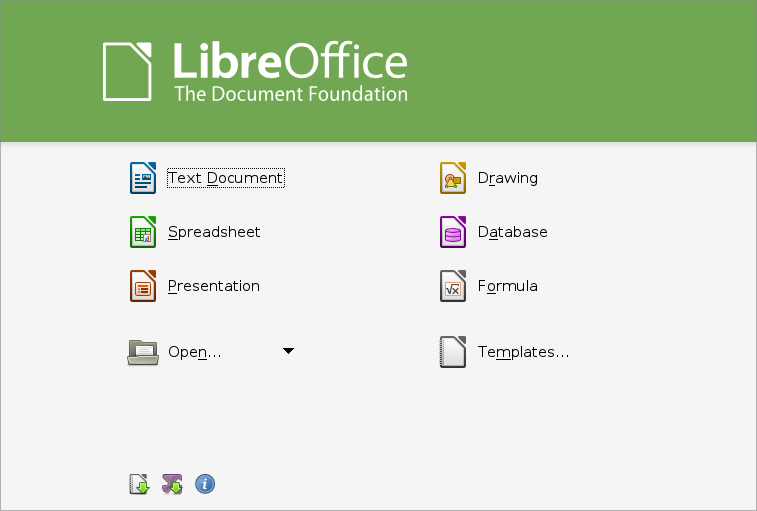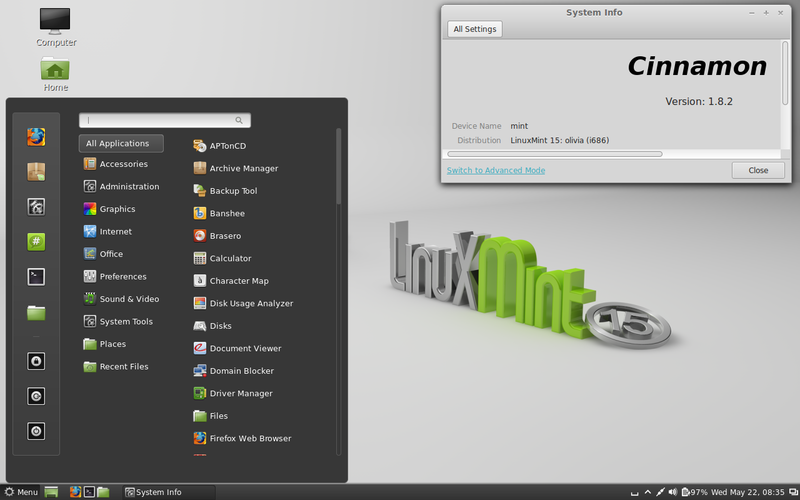09.24.13
Posted in GNU/Linux, Google at 11:05 am by Dr. Roy Schestowitz
It’s fine when a pack of Linux backers controls the market

Summary: A roundup of statistics and news about Android, which is now far ahead of its competitors
WITH SALES and/or activations measured in terms of millions per day, Android has clearly become the market leader. Android might not be super-profitable for Google, but it does give this company a lot of power and it also spreads Linux. That’s all fine. Some criticise Android for attracting more and more proprietary software which is widely used [1], but this is probably inevitable when a platform becomes the primary target for developers. Some key people leave Android because of lack of adherence to freedom/openness (there are also other departures [2,3]), but this platform commands the lion’s share of the market [4]. A new release called KitKat is coming [5] and more companies are building their business around Android [6], which is liberally licensed. Even new companies emerge which basically fork/branch Android [7,8] and they attract investment, showing that Android is not a one-horse race. Support for 64-bit is being facilitated [9] in an age of fewer restrictions in phones (the phones with less restrictions can be more attractive to buyers). Once upon a time this was unforeseeable for phones, which basically came with just one platform ‘baked’ in (like Apple’s hypePhone).
“Diversity is more or less assured and secured here, provided the hardware and software are free to modify.”Those who don’t see the benefit of Linux taking over the mobile market may simply prefer to let some giant companies like Nokia (in the past) or Apple make all the choices, even when these choices are customer-hostile and driven only by the business interests of some wealthy shareholders.
Sure, it would be nice if platforms like Sailfish and Firefox OS gained market share, but any time a platform like Android takes away market from proprietary counterparts it should be considered good news. Diversity is more or less assured and secured here, provided the hardware and software are free to modify [10]. █
Related/contextual items from the news:
-
The BlackBerry Messenger is slated for a Friday release on the Android platform, though will be exclusive to Samsung Galaxy devices for the first three months. The confirmation of the popular IM client coming as an app to Android, after a very long wait, comes from Samsung Nigeria, which tweeted the Friday release date and the three months exclusivity of the app to Galaxy devices. Though BlackBerry has been known to distance itself from exclusive deals, no confirmation, or more importantly, denial has been issued from their side.
-
The front face of Android during many Google events Hugo Barra is suddenly leaving the company. He will be joining the fast growing Chinese smartphone maker Xiaomi. Barra joined Google in 2008 and was in charge of Android product development as a vice president. Barra came second after Andy Rubin, who also stepped down from his position recently.
-
The former head of the Android Open Source Project (AOSP) at Google has jumped ship to the competition.
-
Android continues to gain the market share in the Western Europe while Stephen Elop dragged Nokia to the bottom line.
-
Google is calling the next version of its mobile operating system Android KitKat.
-
Worried about the NSA and other online eavesdroppers? Then startup QSAlpha is working on the smartphone for you.
-
Independent Android firmware project CyanogenMod has become a company, thanks to a $7m Series A financing round led by Silicon Valley venture firms Benchmark Capital and Redpoint Ventures.
-
CyanogenMod is a bridge between users and Android experience which continues to get spoiled by carriers and hardware manufacturers who take forever to bring updates (most of the times these updates never come). CyanogenMod is also known as the open source community around Android where anyone can contribute to the project.
-
With the recent release announcement of the iPhone 5S, which, among other things, sports a fast A7 processor that has the capability of processing 64 bit instruction sets, the community was set abuzz with the prospect of Android’s support for 64 bit. Though Samsung has promised to provide 64 bit support in its mobile devices, Google has been quiet on that front.
-
Permalink
 Send this to a friend
Send this to a friend
Posted in GNU/Linux, IBM, Red Hat at 10:43 am by Dr. Roy Schestowitz

Summary: Why the platform which Richard Stallman created should be evaluated in terms of its adherence to core values, not market value
IBM received a lot of attention a week ago, owing to a promise it had made before. This is significant because Microsoft is bound to suffer the most [1]. Investment is what they call it [2,3] and it’s hardly news [4]. “Innovation” is another word that gets thrown around [5], but not the F word. Yes, Freedom. To IBM, this word is scary; either it means “cheap” or that ‘radical’ thing Richard Stallman talks about. To companies like IBM, it’s still all about money. GNU/Linux pundit SJVN alludes to Red Hat as such [6] now that there are some financial results which, despite early optimism [7,8,9] and beating of expectations [10], Wall Street is not even so excited about [11-14]. But the problem is this: rather than focus on the genesis of GNU/Linux, which was about freedom and users’ control, here we are talking about billions of dollars — sometimes made by selling proprietary software from IBM, installed on very proprietary hardware. If this is progress for GNU/Linux, it’s merely fiscal progress. Our rights online are still perpetually eroding (e.g. the Internet has become a military-grade surveillance platform), perhaps because companies which bear our flag put profit before principles. █
Related/contextual items from the news:
-
Not long ago, Microsoft ruled the computing empire with near-monopolies in PC operating systems, web browsers and productivity applications. The company’s reign, however, was dominated by discord. Competitors complained about Microsoft’s predatory business practices. Users bemoaned the company’s software as a necessary evil.
Fast forward to 2013. Once revered and feared, Microsoft is a shell of its former self. Far from the software and technology leader it used to be, the company now makes repeated missteps in emerging markets such as cloud computing, mobile, search and social.
-
IBM is investing $1 billion in new Linux and open source technologies for IBM’s Power Systems servers.
-
-
The computer giant on Tuesday plans to pledge that it will spend $1 billion over four or five years on Linux and related open-source technologies for use on its Power line of server systems, which is based on the internally developed chip technology of the same name.
-
As many of you know, IBM has a long standing commitment to open source innovation and Linux in particular. We have been part of the Linux Foundation and all its exciting events from day one. Of course, IBM will be part of LinuxCon 2013 – again as a Platinum sponsor. A large team of IBMers is heading to New Orleans next week, where we look forward to connecting with both creators and consumers of the open technology that we come together to celebrate. We have a variety of interesting sessions and fun activities planned for you. Here are some of the highlights:
-
Red Hat’s second quarter was another roaring success no matter by any standard.
-
Wall Street is optimistic about Red Hat , which is slated to report its second quarter results on Monday, September 23, 2013. Analysts project a profit of 22 cents a share, a rise from 20 cents per share a year ago.
-
Red Hat has a popular following among both customers and investors, as it has in many ways helped to disrupt the dominant business model in the industry. Early in its history, many were skeptical that the company could actually profit from open-source software, citing the many companies that locked customers into their proprietary platforms in the hopes of compelling repeat business. Yet years later, Red Hat continues to thrive as demand for flexible solutions is greater than ever. Let’s take an early look at what’s been happening with Red Hat over the past quarter and what we’re likely to see in its report.
-
-
Shares of Linux software company Red Hat fell as much as 9 percent in after-hours trading Monday even though the company reported quarterly revenue and net income that exceeded Wall Street’s expectations.
-
-
-
-
Permalink
 Send this to a friend
Send this to a friend
Posted in Europe, GNU/Linux at 10:25 am by Dr. Roy Schestowitz

Wittelsbacher Fountain in Munich, Germany
Summary: Reports on adoption and success stories for GNU/Linux, gathered in recent days or weeks
YEARS ago when this Web site was young there was legitimate concern that Microsoft’s patent assault — waged with Novell’s help — would suppress the free adoption of GNU/Linux. Ever since Microsoft lost its momentum in businesses, then released Windows Vista, announced losses to the public and laid off staff (while first-tier managers fled the company) things have looked somewhat different. Then came Android world domination, which made Linux the de facto platform almost everywhere except desktops and servers. In desktops and servers, however, progress has been made by GNU/Linux and earlier this month we saw some key news from Germany [1,2], China [3], Argentina [4], and the UK [5], to name just four countries. We are going to cover more such examples in days to come, including some government adoptions.
Taking into account Linux/Android and GNU/Linux, the presence of Linux on the Web is rapidly growing [6]. Microsoft has hardly even got majority market share over there. Its prominence is quickly declining. █
Related/contextual items from the news:
-
The southern German city of Munich has come up with a novel solution for its Windows XP-using citizens, whose operating system will be officially unsupported by Microsoft in April next year.
-
Windows XP users in Germany’s third largest city are being offered free upgrades to Ubuntu ahead of termination of Microsoft support for the OS next Spring.
-
China has been in the spotlight lately. Most recently, the country was rumored to be the major catalyst for the “low cost” iPhone 5c. However, this has largely been discredited since the phone was revealed to not be “low cost”, but instead a relatively expensive, premium device. However, China is still a major player in the computer market and manufacturers are chomping at the bit to take advantage of it. Today, Canonical announces that Hewlett Packard is focused on the nation and will be selling Ubuntu-based laptops in its 1,500 retail stores.
-
The news has been full of headlines of happenings at this year’s LinuxCon, but one tiny little headline stands out today as different. Although it hasn’t made it into English speaking press yet, it seems the Argentine government has sponsored the development of a Linux distribution to be used on all state provided education computers.
-
-
The highlights:
Android/Linux 5.67%
GNU/Linux 2.06%
That Other OS 51.26%
If we only consider non-mobile PCs, TOS gets 70.7% of page-views
Permalink
 Send this to a friend
Send this to a friend
09.23.13
Posted in GNU/Linux, KDE at 5:05 am by Dr. Roy Schestowitz

Summary: Qt5 finds its way into the very core of KDE, arguably the best desktop environment in the world (most features-rich)
The K Desktop Environment (KDE) has undergone some major changes in recent years, development-wise. Some say that development stagnated, whereas others say that it’s as good as ever before. The death of Nokia in Microsoft’s hands has certainly not helped the toolkit upon which KDE is based (Qt), but there are signs of progress because the lead KWin developer merged in Qt5 [1,2], with evident development pace accompanying this milestone [3-6].
Amarok, which was seemingly abandoned for some time after a botched bunch of releases, is back in active development with funding from Google [7] and old KDE applications refuse to become deprecated [8] (Krusader and Konqueror are still better than Dolphin in many respects). There are even active surveys [9] regarding the development of KDE and polls which determine the best KDE distro of 2013 [10].
KDE is anything but dead. It’s my desktop environment of choice and after some bad reputation it received in the 4.0-4.1 releases people should definitely give it a go. It’s now hopping on the Qt5 train, later to be followed by the “5″ branch of KDE — the first major leap in several years. █
Related/contextual items from the news:
-
Almost a month since my last blog post. And of course lots of work in KWin in the frameworks-scratch branch since then – about 160 commits. Today I finally reached the next milestone: dogfooding. I dared to replace the KWin of my working session by the new version based on Qt 5 and it’s useable.
-
The next-generation KDE KWin window manager for KDE Frameworks 5 and using the Qt 5.x tool-kit is quickly entering a usable state and can now handle “dogfeeding” by its developers.
-
-
-
-
-
Once upon a time Linux had what I think was the best music player/manager, its name was Amarok and people even brought it up as a way to try convince others to move to Linux, intelligent playlists, auto fetching of cover arts, lyrics, last.fm integration, etc, and it was great. Fast forward a few years (almost a decade to be fair) and now Amarok and all KDE music players seems to be lacking, with KDE 5.0 maybe this is the time to fix it.
-
Find out 10 reasons why you should try Krusader, a twin-pane file manager that might be faster than Dolphin on older computers or just a better match for your computing habits.
-
Björn Balazs has posted the results of a recent user survey in a “study about the requirements for the screen management tool KScreen.” The purpose was to find out how important screen management is to users and which setting configurations are needed most to aid in development of the Kscreen.
-
Normally, at the end of the year, I tend to run my best annual distro roundups, choosing the finest among five operating systems or flavors thereof that showed the greatest promise in terms of stability, usability, elegance, support, and other curious items in the outgoing twelve-month period. But I have never dedicated much thought to selecting the best implementation of any one particular desktop environment, regardless of the system underneath.
Permalink
 Send this to a friend
Send this to a friend
Posted in Free/Libre Software, Novell, Office Suites, OpenDocument at 4:48 am by Dr. Roy Schestowitz
But the motif stays green, for now…

Summary: SUSE, formerly part of Novell, is no longer committed to LibreOffice
LibreOffice contributors try to put lipstick on a pig [1], but Louis Suárez-Potts (very prominent in this area) makes it clearer [2] that “SUSE has ceded development to others, if any, on LibreOffice.” There are already some distracting announcements [3,4] and on the face of it we’ll need to reconsider the role of IBM and Apache OpenOffice. Maybe they’ll be the only branch to survive one day, even if in Symphony form.
As a LATEX person, I hardly use office suites like LibreOffice, but a lot of people do [5] and this means that we may be left dependent on Apache OpenOffice, some free/libre alternatives like Calligra [6], or privacy-infringing (online) alternatives like Google Docs. █
Related/contextual items from the news:
-
Some readers might be surprised by the way I’m describing the announcement. It might be tempting to see these news as the sign of the upcoming demise of the LibreOffice project. This is very far from being the case and there are two good reasons for that.
First, Suse is NOT dumping LibreOffice developers away. The same developers basically went in a new company and there working on LibreOffice development there. In American parlance, this is called a spin-off.
-
Basically, SUSE has ceded development to others, if any, on LibreOffice. And also calling it a “community” effort–often, if not necessarily in this case–a code term for something thrown under the bus does not inspire confidence in LibreOffice.
-
Today we are happy to announce that the final schedule of the LibreOffice Conference 2013!
-
CloudOn, one of the leading mobile productivity platforms that allows users to create, edit and share documents in real time across devices, has joined the advisory board of The Document Foundation (TDF).
TDF looks after the development of LibreOffice, the free and open source office suite that competes with Microsoft Office.
-
Consider the way that most people use a word processor like LibreOffice’s Writer. Whenever they want to change the default formatting, they select part of the document – for example, a paragraph or a page — and then apply the formatting using the toolbars or one of the menus.
-
Is LibreOffice the only worthwhile office suite for Linux users? Possibly not, thanks to KDE’s Calligra.
Permalink
 Send this to a friend
Send this to a friend
Posted in Apple, GNU/Linux at 4:31 am by Dr. Roy Schestowitz

Summary: What we can copy from Apple and what we oughtn’t ever copy, only abolish
IMITATING Apple’s business practices in order to advance GNU/Linux is not a good idea. Imitating Apple’s presentation, however, may be acceptable (Apple’s patent aggression aside because it’s trigger-happy w.r.t. lawsuits). One thing which Apple is undoubtedly good at is marketing, unless or until it gets caught. Years ago we covered examples where Apple essentially bribed or influenced some bloggers to help manufacture some hype for the hypePad and days ago Apple got caught paying homeless people to pretend to want Apple gadgets rather than a home [1]. That’s just utterly rogue. Think different. Think Apple.
Anyway, there are several Ubuntu-based distributions which try to imitate the appearance (and sometimes behaviour) of Apple’s platforms. Pear OS [2] and Elementary OS [3] are just two of them and they are likely to meet just limited success because they aim at converting Apple fan, who would probably be disappointed as GNU/Linux can’t meet the expectation of being Apple. The many efforts to sell GNU/Linux as a “cheap Windows” (see Xandros, Linspire and several other defunct companies) were never successful because even with Wine GNU/Linux was unable to imitate Windows reliably enough. GNU/Linux is not Windows. And it’s not supposed to be.
“Nobody deserves Apple-branded products as a gift; it’s not a gift, it’s a digital jail in shrink-wrapped boxes.”One distribution which uses some Apple-like graphics but does not go too far in imitating Apple is Linux Mint and right now it tries Apple’s method of selling hardware tied to the operating system [4-6]. Linux Mint is currently the distribution I install for GNU/Linux converts because it gives them the polish of Mac OSuX while not pretending to be Mac OSuX. It is easy to use (good out-of-the-box experience) and it removes the need to be technical for those who are not.
On the technical side, Apple fails on the basics [7], copies Android/Linux [8], and uses technical tricks to punish and restrict customers [9]. Nobody deserves Apple-branded products as a gift; it’s not a gift, it’s a digital jail in shrink-wrapped boxes. █
Related/contextual items from the news:
-
A businessman scheming to get his profit-minded hands on dozens of new iPhones allegedly recruited about 100 homeless people from Skid Row in Los Angeles to wait in line overnight at the Pasadena Apple Store, but many were left unpaid and stranded after his plan was exposed, local media reported Friday.
-
David Tavares, the father of the Pear OS distribution, has just shared a screenshot on Google+, teasing Linux users with the iOS 7-inspired look of his upcoming Pear OS 8 operating system.
-
Perhaps it’s a holdover from the Apple Depression of the 1990s, but I sometimes wonder where I would go if I ever needed to leave the Mac.
-
The MintBox 2 is now available and can be ordered from CompuLab at http://fit-pc.com/web/products/mintbox/
-
Clement Lefebvre, the founding father of the extremely popular Linux Mint operating system, had the pleasure of announcing today, September 13, that the next-gen MintBox mini PC is available for purchase.
-
Linux Gizmos reports that the MintBox mini-PC is shipping with Linux Mint 15 and Core i5 processors. This is a neat little computer, and I particularly like the fact that Linux Mint is the default distro on it.
-
-
Today in Open Source: Did iOS 7 borrow ideas from Android? Plus: Linux Defenders and dangerous patents, and the launch date of Ubuntu Touch 1.0
-
The Free Software Foundation encourages users to avoid all Apple products, in the interest of their own freedom and the freedom of those around them.
Permalink
 Send this to a friend
Send this to a friend
Posted in Patents at 4:07 am by Dr. Roy Schestowitz

Summary: Analysis of the stance of a site which purports to be achieving “patent progress”
Following the GAO study which blames software patents we have been watching with interest how patent boosters warped its conclusions. That’s only to be expected. Lawyers — especially patent lawyers — don’t want to see patent scope being limited.
Several months ago I subscribed with caution to the site called Patent Progress — a site run by “legal” people on the face of it. These are the sorts of people who under the wing of the EFF have been warping somewhat the goal of banning software patents, choosing instead to focus on “bad” patents or patent trolls.
Based on some posts that allude to the GAO study, the people who run Patent Progress want to focus on trolls and not patent scope. This recent post from the Patent Progress blog makes it quite apparent and although the views may depend based on who writes the post, it does seem like prominent (prolific) writers over there continue to obsess over trolls. To quote:
Predatory pricing is the strategy of pricing goods or services below cost in the hopes of driving competitors out of the market and then raising prices to supra-competitive levels. Hovenkamp notes that like predatory pricing, bottom feeder trolls will litigate patent infringement cases even when they are likely to lose in order to generate a reputation for aggressive litigation. In fact, patent trolls have been found to use the same patents over and over again (8 or more times) despite only winning less than 10% of these cases. Once the reputation is established, defendants can no longer rely on patent trolls rationally deciding to drop loser lawsuits and must calculate the costs of litigating a full trial in making the decision to settle. Hovenkamp calls this strategy of short run losses to generate supra-competitive licensing fees predatory patent litigation.
Patent Progress has done some protesting which covers software patents, but the focus of the site seem to align with the sort of reform sought by Google and other large corporations. To them, patent trolls are the problem which merits most emphasis. █
Permalink
 Send this to a friend
Send this to a friend
Posted in GNU/Linux, Ubuntu at 3:53 am by Dr. Roy Schestowitz

Summary: Bodhi Linux 2.4.0 brings with it a panacea for old desktops in need of a free/libre, cutting-edge and powerful operating system
Bodhi Linux is, for the most part, a one-person project [1] which rose to fame [2] a couple of years ago, earning a lot of coverage and observing many ISO downloads. Bodhi Linux is a GNU/Linux distribution based on Ubuntu and it is probably the most popular Enlightenment-based distribution that is derived from Ubuntu (putting aside obscure ones, there have been about half a dozen such distributions in the past half a decade).
“Enlightenment is compatible with very old computers, so for machines that are lesser capable consider giving Bodhi Linux a try.”I was a regular user of Enlightenment over a decade ago (I used it for development with GTK) and surely it does not get the credit or the reputation it deserves. Enlightenment is compatible with very old computers, so for machines that are lesser capable consider giving Bodhi Linux a try. Here are some screenshots [3] of the latest release.
The lead developer, Jeff Hoogland, is a very cool person who is adhering to some decent values. This is not a distribution motivated by financial interests. Some community distros were warped to accommodate such interests much to users’ chagrin. █
Related/contextual items from the news:
-
It has been close to six months since our last Bodhi Linux release – far too long! This is just our normal update release – meaning if you are already a Bodhi user and have been running your system updates then you already have all these additions running on your system!
-
After six months of hard work, Jeff Hoogland announced on September 12 that the final release of the Bodhi Linux 2.4.0 operating system was available for download, bringing improvements and bugfixes.
-
Permalink
 Send this to a friend
Send this to a friend
« Previous Page — « Previous entries « Previous Page · Next Page » Next entries » — Next Page »
Further Recent Posts
- Eight Wireless Patents Have Just Been Invalidated Under Section 101 (Alice), But Don't Expect the Patent Microcosm to Cover This News
Firms that are profiting from patents (without actually producing or inventing anything) want us to obsess over and think about the rare and few cases (some very old) where judges deny Alice and honour patents on software
- 2017: Latest Year That the Unitary Patent (UPC) is Still Stuck in a Limbo
The issues associated with the UPC, especially in light of ongoing negotiations of Britain's exit from the EU, remain too big a barrier to any implementation this year (and probably future years too)
- Links 7/1/2017: Linux 4.9.1, Wine 2.0 RC4
Links for the day
- India Keeps Rejecting Software Patents in Spite of Pressure From Large Foreign Multinationals
India's resilience in the face of incredible pressure to allow software patents is essential for the success of India's growing software industry and more effort is needed to thwart corporate colonisation through patents in India itself
- Links 6/1/2017: Irssi 1.0.0, KaOS 2017.01 Released
Links for the day
- Watchtroll a Fake News Site in Lobbying Mode and Attack Mode Against Those Who Don't Agree (Even PTAB and Judges)
A look at some of the latest spin and the latest shaming courtesy of the patent microcosm, which behaves so poorly that one has to wonder if its objective is to alienate everyone
- The Productivity Commission Warns Against Patent Maximalism, Which is Where China (SIPO) is Heading Along With EPO
In defiance of common sense and everything that public officials or academics keep saying (European, Australian, American), China's SIPO and Europe's EPO want us to believe that when it comes to patents it's "the more, the merrier"
- Technical Failure of the European Patent Office (EPO) a Growing Cause for Concern
The problem associated with Battistelli's strategy of increasing so-called 'production' by granting in haste everything on the shelf is quickly being grasped by patent professionals (outside EPO), not just patent examiners (inside EPO)
- Links 5/1/2017: Inkscape 0.92, GNU Sed 4.3
Links for the day
- Links 4/1/2017: Cutelyst 1.2.0 and Lumina 1.2 Desktop Released
Links for the day
- Financial Giants Will Attempt to Dominate or Control Bitcoin, Blockchain and Other Disruptive Free Software Using Software Patents
Free/Open Source software in the currency and trading world promised to emancipate us from the yoke of banking conglomerates, but a gold rush for software patents threatens to jeopardise any meaningful change or progress
- New Article From Heise Explains Erosion of Patent Quality at the European Patent Office (EPO)
To nobody's surprise, the past half a decade saw accelerating demise in quality of European Patents (EPs) and it is the fault of Battistelli's notorious policies
- Insensitivity at the EPO’s Management – Part V: Suspension of Salary and Unfair Trials
One of the lesser-publicised cases of EPO witch-hunting, wherein a member of staff is denied a salary "without any notification"
- Links 3/1/2017: Microsoft Imposing TPM2 on Linux, ASUS Bringing Out Android Phones
Links for the day
- Links 2/1/2017: Neptune 4.5.3 Release, Netrunner Desktop 17.01 Released
Links for the day
- Teaser: Corruption Indictments Brought Against Vice-President of the European Patent Office (EPO)
New trouble for Željko Topić in Strasbourg, making it yet another EPO Vice-President who is on shaky grounds and paving the way to managerial collapse/avalanche at the EPO
- 365 Days Later, German Justice Minister Heiko Maas Remains Silent and Thus Complicit in EPO Abuses on German Soil
The utter lack of participation, involvement or even intervention by German authorities serve to confirm that the government of Germany is very much complicit in the EPO's abuses, by refusing to do anything to stop them
- Battistelli's Idea of 'Independent' 'External' 'Social' 'Study' is Something to BUY From Notorious Firm PwC
The sham which is the so-called 'social' 'study' as explained by the Central Staff Committee last year, well before the results came out
- Europe Should Listen to SMEs Regarding the UPC, as Battistelli, Team UPC and the Select Committee Lie About It
Another example of UPC promotion from within the EPO (a committee dedicated to UPC promotion), in spite of everything we know about opposition to the UPC from small businesses (not the imaginary ones which Team UPC claims to speak 'on behalf' of)
- Video: French State Secretary for Digital Economy Speaks Out Against Benoît Battistelli at Battistelli's PR Event
Uploaded by SUEPO earlier today was the above video, which shows how last year's party (actually 2015) was spoiled for Battistelli by the French State Secretary for Digital Economy, Axelle Lemaire, echoing the French government's concern about union busting etc. at the EPO (only to be rudely censored by Battistelli's 'media partner')
- When EPO Vice-President, Who Will Resign Soon, Made a Mockery of the EPO
Leaked letter from Willy Minnoye/management to the people who are supposed to oversee EPO management
- No Separation of Powers or Justice at the EPO: Reign of Terror by Battistelli Explained in Letter to the Administrative Council
In violation of international labour laws, Team Battistelli marches on and engages in a union-busting race against the clock, relying on immunity to keep this gravy train rolling before an inevitable crash
- FFPE-EPO is a Zombie (if Not Dead) Yellow Union Whose Only de Facto Purpose Has Been Attacking the EPO's Staff Union
A new year's reminder that the EPO has only one legitimate union, the Staff Union of the EPO (SUEPO), whereas FFPE-EPO serves virtually no purpose other than to attack SUEPO, more so after signing a deal with the devil (Battistelli)
- EPO Select Committee is Wrong About the Unitary Patent (UPC)
The UPC is neither desirable nor practical, especially now that the EPO lowers patent quality; but does the Select Committee understand that?
- Links 1/1/2017: KDE Plasma 5.9 Coming, PelicanHPC 4.1
Links for the day
- 2016: The Year EPO Staff Went on Strike, Possibly “Biggest Ever Strike in the History of the EPO.”
A look back at a key event inside the EPO, which marked somewhat of a breaking point for Team Battistelli
- Open EPO Letter Bemoans Battistelli's Antisocial Autocracy Disguised/Camouflaged Under the Misleading Term “Social Democracy”
Orwellian misuse of terms by the EPO, which keeps using the term "social democracy" whilst actually pushing further and further towards a totalitarian regime led by 'King' Battistelli
- EPO's Central Staff Committee Complains About Battistelli's Bodyguards Fetish and Corruption of the Media
Even the EPO's Central Staff Committee (not SUEPO) understands that Battistelli brings waste and disgrace to the Office
- Translation of French Texts About Battistelli and His Awful Perception of Omnipotence
The paradigm of totalitarian control, inability to admit mistakes and tendency to lie all the time is backfiring on the EPO rather than making it stronger
- 2016 in Review and Plans for 2017
A look back and a quick look at the road ahead, as 2016 comes to an end

























 Content is available under CC-BY-SA
Content is available under CC-BY-SA